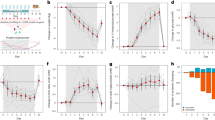Abstract
Objective: To compare nutrition knowledge and food intake in 7-y-old intervention and control children in an atherosclerosis risk factor intervention trial after 6.5 y of nutrition counselling given to the parents.
Design, subjects and methods: Intervention families in the Special Turku Coronary Risk Factor Intervention Project received child-oriented nutritional counselling one to three times a year since child's age of 7 months, aimed at reduced saturated fat and cholesterol intake. Children's nutrition knowledge was analysed in a time-restricted cohort of 70 seven-y-old (34 boys) intervention children and 70 control children (40 boys) with a picture identification test. For comparison, children's food intake was evaluated using scores developed for the project that reflected quality and quantity of fat and quantity of salt in children's two or three 4-day food diaries recorded between 5.5 and 7 y of age.
Results: Child-targeted nutrition counselling of the intervention families only slightly increased intervention children's knowledge of heart-healthy foods (42.6% vs 34.9% correct answers by the intervention and control children, P=0.057). Only ≤20% of the children were able to adequately justify their answers in the test. The food diaries of the intervention children comprised more foods low in saturated fat and high in unsaturated fat than those of the control children (57.1% vs 41.7% of the maximum score for low fat foods, P=0.0001; 48.9% vs 37.7% for high unsaturated fat foods, P=0.0009, respectively), but the intervention and control children consumed similar amounts of low-salt foods (P=0.23). Nutrition knowledge and food use scores correlated poorly (r=−0.20–0.35).
Conclusions: Child-targeted nutrition counselling repeatedly given to the parents during and after child's infancy strongly influenced food choice scores of the 5.5–7-y-old children but failed to influence children's salt intake or scores in a nutrition knowledge picture test.
European Journal of Clinical Nutrition (2001) 55, 260–267
This is a preview of subscription content, access via your institution
Access options
Subscribe to this journal
Receive 12 print issues and online access
$259.00 per year
only $21.58 per issue
Buy this article
- Purchase on Springer Link
- Instant access to full article PDF
Prices may be subject to local taxes which are calculated during checkout
Similar content being viewed by others
Author information
Authors and Affiliations
Contributions
Guarantor: Minna Räsänen.
Contributors: OS, TR and JV originally designed the STRIP study and are responsible for study co-ordination. JT is responsible for the statistical analysis of the food choice and nutrition knowledge results and MR, HN and SK for writing the primary version of the paper.
Rights and permissions
About this article
Cite this article
Räsänen, M., Niinikoski, H., Keskinen, S. et al. Nutrition knowledge and food intake of seven-year-old children in an atherosclerosis prevention project with onset in infancy: the impact of child-targeted nutrition counselling given to the parents. Eur J Clin Nutr 55, 260–267 (2001). https://doi.org/10.1038/sj.ejcn.1601153
Received:
Revised:
Accepted:
Published:
Issue Date:
DOI: https://doi.org/10.1038/sj.ejcn.1601153
Keywords
This article is cited by
-
Influence of adolescents’ and parental dietary knowledge on adolescents’ body mass index (BMI), overweight/obesity in 2004–2015: a longitudinal study
Archives of Public Health (2023)
-
Kardiovaskuläre Risikofaktoren im Kindes- und Jugendalter
Bundesgesundheitsblatt - Gesundheitsforschung - Gesundheitsschutz (2013)
-
Trait-specific tracking and determinants of body composition: a 7-year follow-up study of pubertal growth in girls
BMC Medicine (2009)
-
Impact of nutrition counselling on nutrition knowledge and nutrient intake of 7- to 9-y-old children in an atherosclerosis prevention project
European Journal of Clinical Nutrition (2004)



